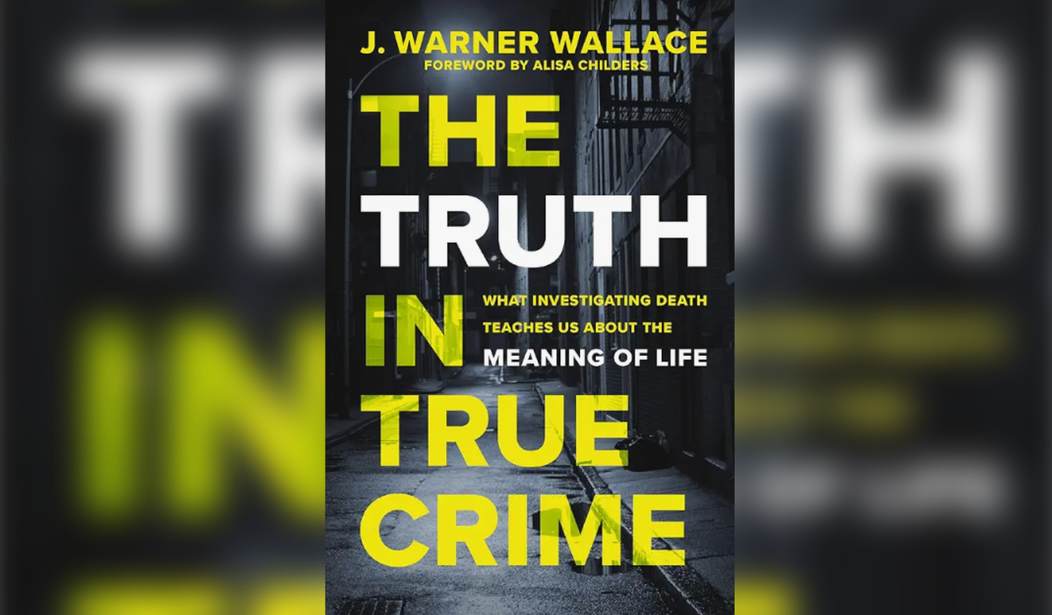Former Los Angeles Police Detective and “Dateline NBC” featured cold-case expert J. Warner Wallace is a national treasure for this country and a precious asset for the Christian church in America and worldwide.
Why do I say that? Because I’ve read his latest book, “The Truth in True Crime,” as well as his previous major works, including “Forensic Faith,” “Cold-Case Christianity,” “Person of Interest” and "God's Crime Scene."
Want to give yourself a priceless gift? Buy all five of Wallace's books, take a week off, and go somewhere quiet so you can read them undisturbed and think through the implications of what you learn (which I guarantee will be a great deal).
Be sure and take your Bible with you, too, because in no short order, you will find yourself wanting to dig into it like never before. I can confidently promise you that taking a Wallace Week will have a huge and productive impact on your life.
That's because Jesus Christ had an incredibly profound impact on Wallace's life years ago when he was an L.A. police detective and his wife, who was already a Christian, invited him to go with her to church one Sunday.
Despite being a confirmed atheist, Wallace agreed and was then challenged by the pastor's sermon to investigate the claims of Jesus Christ to be the "Way, the Truth and the Life" and "the only name given under heaven by which we may be saved" for eternity.
Being a detective, Wallace decided to apply the investigative skills he had honed with the LAPD (his dad had been with the LAPD, too, and his son is today) to the evidence for the claims of Christ to be God. What he found was beyond persuasive; it was irresistibly logical, reasonable, and transformative.
What followed was an amazing career in which Wallace proved to be blessed with an amazing gift for solving murder cases that had gone unsolved for decades. His success as a cold-case detective eventually led to his many appearances on "Dateline," and God used that gift and experience to mold Wallace into one of the most dynamic and effective Christian apologists ever.
In his previous books, Wallace demonstrated how applying the same rules of logic, source qualification, forensic analysis, historical context and other investigative skills required to solve cold murder cases leads one inexorably to the conclusion that the most reasonable assessment of the claims of Jesus Christ is that they are true.
In this latest work, however, Wallace takes a bit of a different path. As he explains in his preface:
I wasn't a Christian when I started my career as a detective. But along the way, I began investigating the case for God's existence, the reliability of the Gospels, the resurrection of Jesus and the divine impact of Jesus on human culture. I've written about my discoveries in other books.
This book is different. It contains truths about life gleaned from investigations about death. It also includes the surprisingly accurate description of human nature found, not in the latest scientific journals, but in the ancient pages of the Bible.
"The Truth in True Crime'" is intended to be a practical wisdom book (the kind one might pen for one's grandchildren) and a Christian evidence book (the kind of book one might write for those who still doubt the explanatory power of Christianity).
Wallace shares 15 "leads," or lessons, about life and death he has gleaned while investigating the evidence for Jesus and Christianity. These include, among others, "Legends, Liars, and Liabilities: How to Moderate Your Celebrity. You Were Created to Pursue Humility" and "Sense and Suffering: How to Surprise Yourself by Flourishing After a Trauma. You Were Created to Overcome."
For our purposes here, however, let's dig further into one of the leads that I found of most interest — "Death Sentences and Life Without Parole: How to Rethink the Nature of Death So You Can Live a Better Life. You Were Created for Eternity."
(Allow me to make it crystal clear that when Wallace talks about living a better life, it has nothing to do with Joel Osteen and others of his ilk.)
As Wallace explains, we humans have a unique relationship with death and dying. We all know it comes to all of us, and so we suffer what researchers call "death anxiety." But we react in a variety of ways in response to this innate knowledge about our futures.
Death anxiety decreases our quality of life generally and people who fear death typically have lower self-esteem. They experience deeper, prolonged grief after losing a loved one, are more likely to lose sleep, suffer depression, and experience greater post-traumatic stress.
Death anxiety can also lead to a number of mental challenges, including a variety of anxiety disorders, phobias and eating habits. Our fear of death even causes some of us to withdraw emotionally and become less compassionate or intimate.
We come up with all kinds of palliatives seeking to cope with this problem of knowing that we will die. Consumerism, or the mentality that "he who accumulates the most toys wins," is one such mechanism, as is goal-setting, becoming famous or respected in one's profession, risk-taking, and even philosophical contemplation.
Wallace also points to "religion" as one of the ways we cope with death anxiety, but there are fundamental differences in how the world's major religions offer reassurance. Buddhism, for example, tells you that your self is an illusion, so don't worry about what happens after you die.
Hinduism has reincarnation, but you have no control over what you will be or how you experience life in your next life. That can prompt even more anxiety. Atheism is even more problematic, teaching that you are just a collection of molecules in motion and that when you die, you won't be in motion. But you'll still just be a bunch of molecules, dirt molecules to be exact.
Ancient paganism, especially among the classical Greeks and Romans, understood immortality in fame as compensation for death anxiety. A superb illustration of this attitude is seen in the movie "Troy" when Achilles, the Greek champion, is summoned to fight Boagrius, the Trojan champion.
When Achilles opts to turn around and not fight after being insulted by the angry Greek King, Agamemnon, it is Nestor, a subordinate King known in the Homeric epic for dispensing wisdom, who points out to Achilles, "Achilles, look at the men's faces. You can save hundreds of them. You can end this war with a swing of your sword. Think how many songs they will sing in your honor."
That's all Achilles needs to hear; he reverses course, runs directly at Boagrius while avoiding his two spear throws, then leaps above the giant's shoulder and kills him with one lethal plunge of his sword into his opponent's neck. But of course, Achilles was still dead as all those songs about him were being sung! Problem not solved.
What about Christianity? As Wallace puts it, Christianity "argues for a dualistic sense of self. According to this view, you are more than a physical, material being. You have a soul. This 'soulish' self transcends your mortal experience and carries your characteristics, attributes, traits, and memories into eternity where you will be made whole again when your physical body is resurrected and redeemed."
Understand here that, if you are a skeptic who thinks Christianity is merely a collection of men's fables designed to reassure, you cannot know for certain if you are right until you do what Wallace did by investigating the evidence, evaluating it using the same rules and standards that you would in evaluating other claims, then reach your own conclusion.
In doing so, may I suggest you start with the evidence for the Resurrection of Jesus because, as Paul tells us, if Jesus was not resurrected from the dead, then we Christians are the "most foolish of men"?
But if the resurrection is a historical event, then that changes everything because it proves that Jesus was and is exactly what He claimed, including that "no man comes to the Father but through me."
If you don't already know Him as your Lord and Savior, I pray that this post prompts you to do what J. Warner Wallace did when he was an atheist — have the intellectual courage to investigate the evidence and then reach your own conclusion. I can't think of a better place to start your investigation than with "The Truth in True Crime."










Join the conversation as a VIP Member